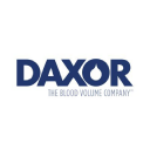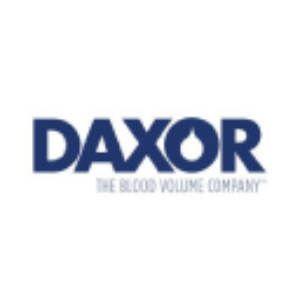Welcome to our dedicated page for DAXOR news (Ticker: DXR), a resource for investors and traders seeking the latest updates and insights on DAXOR stock.
Daxor Corp (DXR) delivers critical advancements in blood volume measurement through its FDA-cleared BVA-100 technology. This page provides investors and healthcare professionals with centralized access to official news, financial updates, and clinical developments related to DXR’s diagnostic innovations.
Track press releases covering product milestones, peer-reviewed research validations, and strategic partnerships. Stay informed about quarterly earnings, regulatory filings, and advancements in fluid management diagnostics. All content is sourced directly from verified company communications to ensure accuracy.
Key updates include BVA-100 adoption metrics, clinical trial outcomes, and operational expansions. Bookmark this page for real-time insights into DXR’s role in transforming patient diagnostics through precise blood volume analysis. Regularly updated to serve as your primary resource for unbiased, factual Daxor Corp developments.
Daxor Corporation (Nasdaq: DXR) announced significant findings from a new pilot study published in the Journal of Critical Care, validating their Blood Volume Analysis (BVA) technology for COVID-19 and sepsis patients. The study revealed that 48% of COVID-19 patients were incorrectly assessed for fluid status by clinicians, highlighting the critical need for more accurate measurement tools.
The research demonstrated that sepsis patients showed higher albumin transudation rates compared to COVID-19 patients, indicating more severe blood vessel integrity breakdown. The study coincides with Daxor's recent FDA clearance in August 2025 for their new rapid BVA system, which is three times faster than their previous BVA-100™ analyzer while maintaining 95% accuracy.
Daxor Corporation (Nasdaq: DXR), a leader in blood volume measurement technology, announced its participation in the H.C. Wainwright 27th Annual Global Investment Conference. CEO and President Michael Feldschuh will deliver a presentation that will be available on-demand starting September 5, 2025, at 7:00 a.m. ET.
The conference will take place from September 8-10, 2025 at the Lotte New York Palace Hotel. Registered conference investors can schedule one-on-one meetings with Mr. Feldschuh and access the presentation through the conference registration portal.
Daxor Corporation (Nasdaq: DXR), the leader in blood volume measurement technology, released a mid-year shareholder update highlighting significant achievements in 2025. The company secured FDA clearance for its new rapid, lightweight Blood Volume Analysis System in August 2025, which is three times faster and more portable than its predecessor BVA-100.
Financial highlights include a 73% increase in unaudited revenues for H1 2025 compared to H1 2024, driven by diagnostic kit sales and military contracts. The company's net assets grew to $36.6 million, with NAV increasing to $7.15 per share, up $0.40 from June 2024.
Clinical validation strengthened with multiple studies, including research showing 2.61 times better survival in BVA-identified euvolemic heart failure patients. The company expanded market adoption with multiple new facility adoptions across the U.S. in 2025.
Daxor Corporation (NASDAQ: DXR), the global leader in blood volume measurement technology, has made available the replay of its Nasdaq Closing Bell Ceremony from August 8, 2025. The ceremony celebrated a significant milestone: the FDA 510(k) clearance for the company's new Daxor BVA™ (Blood Volume Analyzer).
The next-generation device is characterized as a patent-pending, rapid, compact, and hand-held blood volume measurement system designed for lab-based use.
Daxor Corporation (NASDAQ: DXR) has received FDA 510(k) clearance for its next-generation Blood Volume Analyzer (BVA), a revolutionary diagnostic device for precise fluid management. The new hand-held, lab-based system offers significant improvements over its predecessor, being 3x faster and weighing only 7 pounds.
The device addresses critical healthcare challenges across multiple conditions, including heart failure, critical care, and sepsis. Clinical studies have shown remarkable results, with BVA-guided care reducing heart failure mortality by 86% and demonstrating 66% lower mortality in ICU patients. The system also helped achieve 56% fewer hospital readmissions and shorter hospital stays.
Developed in collaboration with the U.S. Department of Defense, the technology builds on Daxor's extensive experience with over 75,000 tests shipped and 50 years of research.
Daxor Corporation (Nasdaq: DXR), the global leader in blood volume measurement technology, has announced the adoption of its Blood Volume Analysis (BVA) technology by three new hospitals. The expansion includes both the company's CLIA-certified ezBVA Lab service and on-site blood volume analyzers.
The new facilities include a Tennessee medical center adopting ezBVA Lab services for cardiology, a major Arkansas hospital implementing an on-site analyzer, and a leading referral hospital serving Arizona, Nevada, and Utah utilizing the ezBVA Lab service for heart failure patients. The company expects continued sales growth throughout 2025 as clinicians increasingly recognize BVA's benefits for optimizing fluid management.
Daxor Corporation (DXR) announced significant findings from a Duke University Medical Center study published in the American Heart Journal regarding Blood Volume Analysis (BVA) in heart failure patients. The research demonstrates BVA's effectiveness in differentiating between true and dilutional anemia in heart failure patients.
Key findings revealed that among heart failure patients diagnosed with anemia, 60% had true anemia while 40% had dilutional pseudo-anemia. Patients with dilutional pseudo-anemia showed higher tendencies toward heart failure hospitalization. The study also found that heart failure patients with red blood cell mass deficit or true anemia demonstrated poorer exercise capacity.
The research validates BVA's importance in heart failure management, as standard blood panels are not sufficiently sensitive or specific for this purpose.
Daxor Corporation (DXR) has expanded its blood volume measurement technology to two new U.S. healthcare systems. The expansion includes: 1) Implementation of the ezBVA Lab service at a premier regional referral center in East Tennessee, providing comprehensive diagnostic results within 24 hours for outpatient cardiology services, and 2) Installation of an on-site BVA analyzer system at a leading healthcare facility in the Pacific Northwest for both inpatient and outpatient diagnostic needs.
The company's dual implementation model offers flexibility through both laboratory services and on-site systems. Daxor's proprietary technology provides gold-standard blood volume measurements that have been proven to reduce mortality, hospital readmissions, and length of stay in heart failure and critical care patients.
Daxor Corporation (DXR) has expanded its presence in Florida by launching a new Blood Volume Analysis (BVA) program at a major healthcare center in Tampa Bay. The facility will utilize Daxor's Tennessee-based CLIA-certified ezBVA Lab service, which provides blood volume analysis results within 24 hours of sample receipt.
The service offers 98% accurate measurements for fluid management in various conditions including cardiac, renal, and critical care. The ezBVA Lab service eliminates the need for capital investment while maintaining full reimbursement through CPT codes under both public and private insurance plans.
Daxor Corporation (DXR) has expanded its blood volume analysis (BVA) capabilities by adding three new medical centers to its network. The expansion is driven by the company's ezBVA Lab service, a CLIA-certified facility that provides precise blood volume analysis results within 24 hours. The new adoptions include a leading regional referral center in Philadelphia's northern suburbs, a premier northern Kentucky hospital, and an Arkansas community hospital.
The ezBVA Lab service operates on a zero-capital investment model with full reimbursement coverage, making it an attractive solution for healthcare providers. All three facilities will implement the service primarily for outpatient heart failure management, with potential for inpatient expansion.


